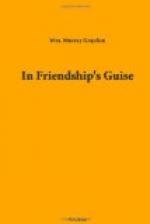Jimmie told the rest of the story in the privacy of a cab, which drove the two rapidly from Victoria station to Bedford street, Strand. They found Mr. Tenby in his office, and had a long interview with him. The solicitor had read the papers, and when he was put in possession of the further important facts bearing on the case, he promised to secure Jack’s release as soon as the necessary legal formalities could be complied with. Moreover, he promised to go to Holloway within the course of an hour or two, and communicate the good news to the prisoner. Jimmie was anxious to go with him, but he reluctantly abandoned the project when the solicitor assured him that it would be most difficult to arrange.
“Be patient, gentlemen, and leave the matter in my hands,” said Mr. Tenby. “I think we shall have Mr. Vernon out of Holloway to-morrow, and without a stain on his character.”
Sir Lucius and Jimmie walked to Morley’s and separated. The former went into the hotel, half resolved to pack up his luggage and take an early train in the morning to Priory Court; he was tired of London and the recent excitement he had passed through, and longed for his country home. But, on second thought, he altered his mind, and concluded to wait until Jack Vernon was a free man again; he was strangely interested in the unfortunate young artist, and was as anxious as ever to have a talk with him on matters of a private nature.
Jimmie went to his chambers in the Albany, where he removed the dust of travel and changed his clothes. He did not at once go out to dinner, though he was exceedingly hungry. He was impulsive and impatient, and he had conceived a plan whereby he might punish Victor Nevill’s perfidy without a public exposure, and at the same time, he fondly hoped, do Jack a good turn.
“It will hardly be safe to wait longer,” he reflected, “for all I know to the contrary, the girl may be married to-morrow. She will be glad to have her eyes opened—I can’t believe that she is in love with that blackguard. As for Sir Lucius, I would rather face a battery of guns than tell the dear old chap the shameful story to his face. But it must be told somehow.”
Jimmie proceeded to carry out his plans. He took Diane’s last letter from its hiding-place, and sitting down to his desk he made two copies of it, prefacing each with a brief explanation of how the statement had come into his hands. It was a laborious task, and it kept him busy for two hours. At nine o’clock he went out to dinner, and on the way to the Cafe Royal he dropped two bulky letters into a street-box. One was addressed to “Miss Madge Foster, Strand-on-the-Green, Chiswick, W.” The other to “Sir Lucius Chesney, Morley’s Hotel.”
* * * * *
It was ten o’clock in the morning, and the phenomenal November weather showed no signs of breaking up. The sun shone brightly in Trafalgar Square, and the people and busses, the hoary old Nelson Column and its guardian lions, made a picture more Continental than English in its coloring.




